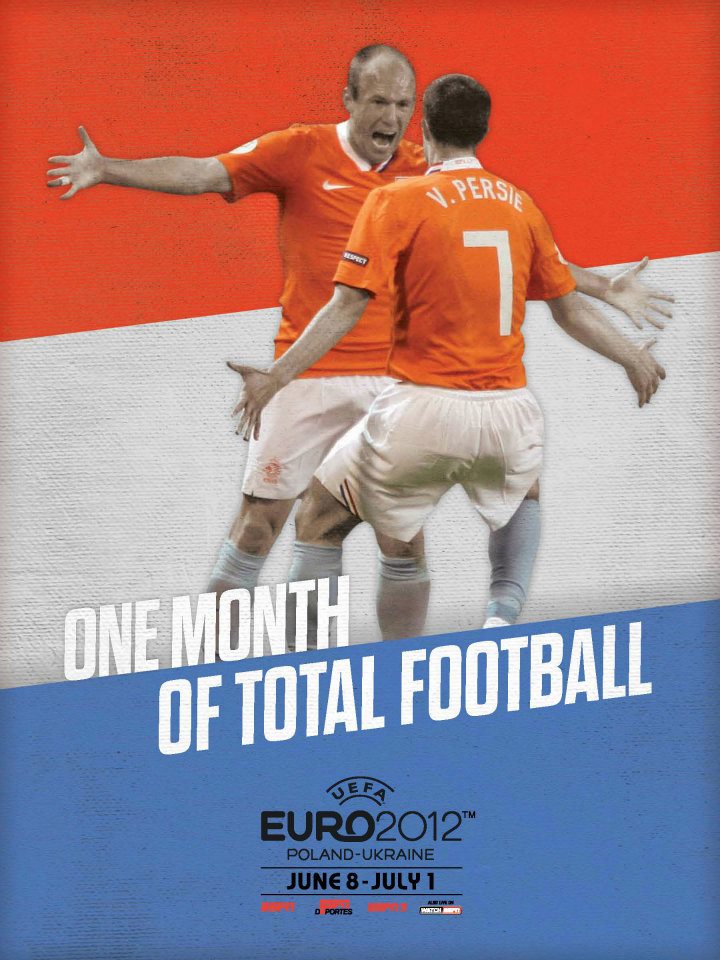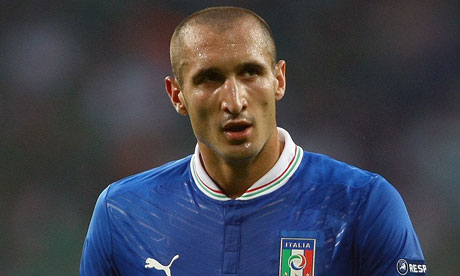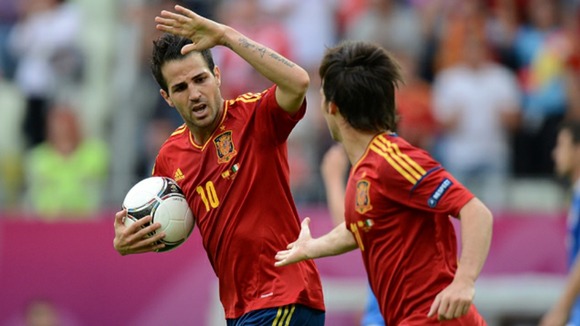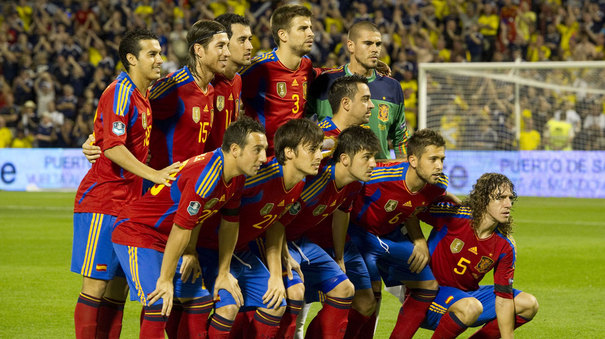After the austerity of the World Cup in South Africa and last summers Copa América, this year’s European Championship feels like something of a throwback. The contests have been exciting, the refereeing generally excellent, and teams playing positive football have generally profited.
We’ve seen some big sides underperform, and some that have acquitted themselves well miss out on the quarter finals. Russia’s staggering, if somewhat predictable, collapse was no less heartbreaking for their supporters than those of a Croatia side who just feel short in Group C.
Germany have hardly broken a sweat in topping the fiendishly even-matched (at least, from what it appeared outset) group B, while it’s a measure of the standards being demanded now of Spain that many critics have been underwhelmed as they claimed 7 points. None of their players quite made this XI, but those on the bench all came very close.
 |
| Holland- total meltdown |
Big players have failed to turn up, most abundantly in Holland’s dismal exit. Players in essentially limited sides have excelled, and several who’ve already departed have caught the eye. Finding a middle ground between the best individuals and those who might, theoretically, form a balanced starting XI is no easy task but here this writer has erred on the side of the former whilst keeping an eye on the latter.
Naturally, there are players omitted here, at least from the initial XI, who’ve performed excellently- none more so, perhaps, than the duo of Andrea Pirlo and Andrés Iniesta. Again, this is where the question of balance comes into play. Every midfield needs a water carrier, yet the dynamic Sami Khedira has been that and so much for Germany.
In a tournament of few genuinely outstanding goalkeeping performances, it seems reasonable to go with the two most dependable; Manuel Neuer and Gigi Buffon. In truth, there is very little to separate the pair.
 |
| Giorgio Chiellini- Colossus |
The most straightforward selection is the heart of the defence. Here, Juventus’ Giorgio Chiellini has been a rock. Combative, clever and masterful in the air he provided the steel that saw his side come ever so close to shutting out Spain. His leadership will be missed against England.
At his side, the stylish Mats Hummels proved impossible to overlook. Now a double Bundesliga winner, he’s given the continent a clear demonstration of his prowess than was missed in Borussia Dortmund’s disappointing Champions League campaign.
Bt contrast, the most difficult position in terms of who to omit has been the full-back area, not just in terms of those in a first XI but also for those in reserve. But, to my mind, both Fábio Coentrão and Darijo Srna deserved their selection. Coentrão. hindered by the presence of the excellent Marcelo at Real Madrid has at times appeared something of a luxury utility man over the past season. But here, his energy and drive have reminded us of the excitement he created in breaking onto the world stage in South Africa two summers ago.
Shakhtar Donetsk’s Darijo Srna may be capable of playing at fullback, on the wing, and even at the base of midfield, but the Croatian is anything but a utility figure. Here in this tournament, starting at rightback he’s shown us every facet of his game, and given a masterclass in how to impose yourself on a game from a nominally defensive position. His relentless energy, timing and positional sense- along with his ability to read the game and whip in a cross- makes him a nailed on starter in this XI.
 |
| Luca Modric excelled against Spain |
Srna wasn’t the only Croatian to impress. In midfield, Luca Modric had an excellent tournament. Having controlled their opening game against Ireland, his move further up the park from his deep-lying role was a game changer against Italy. His intelligence in finding space against the World Champions Spain in their narrow defeat reinforced the initial impression, and he could well be the standout performer to be absent as we move to the knockout stages.
 |
| João Moutinho- Deco's heir |
With Khedira alongside him, another impressive man in the middle- even if his most important work is often far from eye catching- is João Moutinho. An all rounder in a Portuguese midfield of all rounders, what has been most striking has been his organisational capability, wedded to his smart and constructive use of possession.
The forward line was another area where the slenderest of margins came into play. Again, the question of striking a balance is important, but also taken into account has been the overall impact upon games. It is for that reason, that despite his goals, Mario Gomez just misses out. But there’s every chance the Bayern Munich man will go on to be be crowned the competition’s top goalscorer.
 |
| Ibra- gone, but not forgotten |
Zlatan Ibrahimovic, alongside Modric has probably had the best tournament of those who’ve already departed. There was a little bit of everything in the big Swede’s play- touch, link up play, aerial ability and of course goals. The limitations of some of his team-mates, and his ability to shine even as his team performed poorly in their opener against Ukraine is a testament to this serial winner’s refusal to countenance defeat.
Completing the attack, we have the tournament’s surprise emergence alongside a player tipped by many in the know of great things who certainly hasn’t disappointed. It took a mere three minutes for Wolfsburg’s Mario Madzukic to demolish the aura of defensive strength surrounding Giovanni Trappatoni’s Republic of Ireland. He went on to dominate both Richard Dunne and Seán St. Ledger so comprehensively in the air as to render the veteran coach’s set-up redundant, and turned out another thoroughly impressive display to haul his side level against Italy on the back of that.
The final inclusion is CSKA Moscow’s Alan Dzagoev. The man from the Caucasus has long been something of an enigma, albeit one who announced his presence to us with a wonderfully taken goal at Old Trafford as far back as 2009. Here, he netted himself three and despite not scaling the same heights as Russia were eliminated by Greece, he still showed far more than any of his more established team-mates.
(4-3-3)
Manuel Neuer (GER)
Fábio Coentrão (POR)
Giorgio Chiellini (ITA)
Mats Hummels (GER)
Darijo Srna (CRO)
Luca Modric (CRO)
Sami Khedira (GER)
João Moutinho (POR)
Mario Mandzukic (CRO)
Zlatan Ibrahimovic (SWE)
Alan Dzagoev (RUS)
Bench:
Gianluigi Buffon (ITA)
Phillip Lahm (GER)
Theodor Gebeiselassie (CZE)
Olof Mellberg (SWE)
Pepe (POR)
Giorgos Karagounis (GRE)
Andrés Iniesta (ESP)
Andrea Pirlo (ESP)
Mesut Ozil (GER)
Cesc Fabregas (ESP)
Cristiano Ronaldo (POR)
Mario Gomez (GER)


